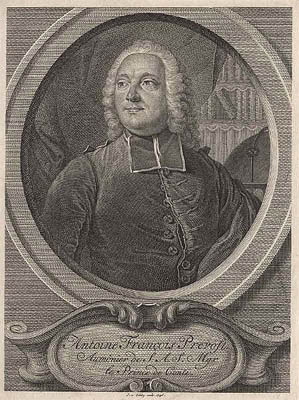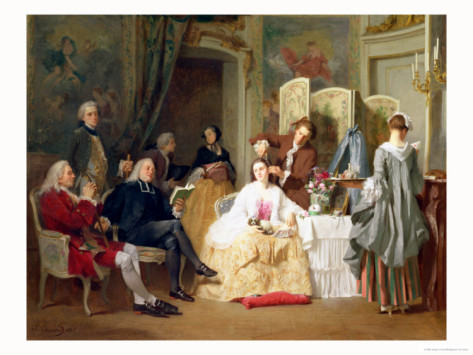Perfide Manon and Abbe Prevost. She was the classic cocotte, he the classic dupe; first the Abbe wrote his famous story, and then he set out to live it…
…He began to write a novel, of frenzied passion and bloodcurdling adventures. He must have presented an edifying picture to his superiors as he sat walled with mighty folios, scribbling away at what was presumed to be the Gallia Christiana. He called his novel Memoires et aventures d’un homme de qualite. Four small volumes were published in 1728, with notable success in the world, if not in the monastery. The author then asked papal authority to transfer to a less austere establishment of the Benedictine rule. An apostolic brief was granted, but its validation in France was held up while the authorities investigated.

— Prévost’s Manon Lescaut is the basis of the operas Manon, by Jules Massenet, and Manon Lescaut, by Giacomo Puccini. A classic example of the 18th-century novel of feeling, Manon Lescaut tells the story of a young man of good family who ruins his life for a courtesan.
From an early age, Prévost displayed many of the weaknesses characteristic of the hero of his most famous work. Two enlistments in the army alternated with two entries into the novitiate of the Society of Jesus, from which he was dismissed in 1721. In that year he took vows as a Benedictine monk and in 1726 was ordained a priest. In 1728 he fled to England. One of his numerous love affairs caused him to lose his job there as a tutor and to go to Holland in 1730. In 1735 Prévost returned to England to escape his Dutch creditors and was briefly imprisoned in London for forgery. After secretly returning to France, he was reconciled with the Roman Catholic church (although he may have been a Protestant during his exile). —click image for source…
Impatient, the Abbe fled the convent, doffed his gown, and resumed the costume and sword of the gentleman. His ecclesiastical superiors obtained a lettre de cachet for his arrest. In this document he is described as being of middle height, blond, with wide-set blue eyes, full face, and ruddy complexion. He now proposed to turn Protestant. He obtained from the chaplain of the Dutch embassy a letter of introduction to the Archbishop of Canterbury, presenting himself as an interesting convert. He may have been moved by the knowledge that the English court pensioned Catholic refugees ripe for conversion. In November 1728, he took ship for England.
In London, the interesting convert used his letters and his charm to establish himself. He found lodgment as tutor to the son of Sir John Eyles, eminent in the business and political worlds. In his household Prevost remained for two years, touring southern England and writing.
This happy situation was suddenly ended, according to contemporary gossips, by an affaire de coeur. Specifically, it was whispered that the ex-priest aspired to marry Sir John Eyle’s only daughter, and that the proud Englishman bought him off and had him banished from the realm. ( to be continued)…
ADDENDUM:
(see link at end)…”Manon Lescaut (this she told me was her name) seemed gratified by the visible effect of her own charms. She appeared to me not less excited than myself. She acknowledged that she was greatly pleased with me, and that she should be enchanted to owe to me her freedom and future happiness. She would insist on hearing who I was, and the knowledge only augmented her affection; for, being herself of humble birth, she was flattered by securing for her lover a man of family.
“After many reflections we could discover no other resource than in flight. To effect this it would be requisite to cheat the vigilance of Manon’s guardian, who required management, although he was but a servant. We determined, therefore, that, during the night, I should procure a post-chaise, and return with it at break of day to the inn, before he was awake; that we should steal away quietly, and go straight to Paris, where we might be married on our arrival. I had about fifty crowns in my pocket, the fruit of my little savings at school; and she had about twice as much. We imagined, like inexperienced children, that such a sum could never be exhausted, and we counted, with equal confidence, upon the success of our other schemes.
“After having supped, with certainly more satisfaction than I had ever before experienced, I retired to prepare for our project. All my arrangements were the more easy, because, for the purpose of returning on the morrow to my father’s, my luggage had been already packed. I had, therefore, no difficulty in removing my trunk, and having a chaise prepared for five o’clock in the morning, at which hour the gates of the town would be opened; but I encountered an obstacle which I was little prepared for, and which nearly upset all my plans.
“Tiberge, although only three years older than myself, was a youth of unusually strong mind, and of the best regulated conduct. He loved me with singular affection. The sight of so lovely a girl as Manon, my ill-disguised impatience to conduct her to the inn, and the anxiety I betrayed to get rid of him, had excited in his mind some suspicions of my passion.Read More:http://www.gutenberg.org/files/468/468-h/468-h.htm









 COMMENTS
COMMENTS



